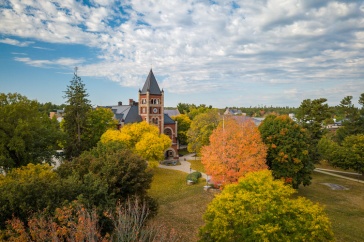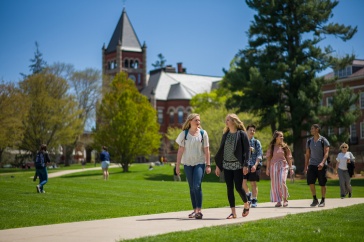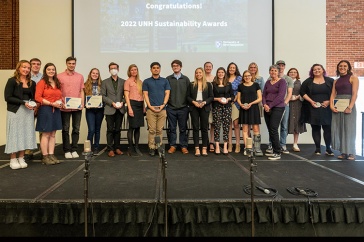
On a spring day in 1943, Irving “Sheik” Karelis took the mound for the UNH baseball team and won a 13–1 victory over rival University of Maine in the first game of a double-header. Despite temperatures in the 90s, he insisted on pitching the second game as well, winning it 3–1. When it was over, Sheik had worked 18 innings, starting, finishing and winning back-to-back games, a UNH record that remains unbroken.
It was just one of Sheik’s many baseball achievements during his years in Durham. He also pitched five shutouts, had a three-year varsity record of 20-3, went 8-1 as a senior and was named All-New England three times by The Boston Globe.
His athletic ability had been obvious from his early teens. At age 15 he set a record in the Haverhill, Massachusetts, Junior League by striking out 25 of 27 batters. He was a star pitcher for Haverhill High School and the youngest player ever to win a spot in the competitive Cape Cod League.
A few days after his record-setting double-header, Sheik enlisted in the U.S. Navy, becoming an accomplished pitcher for Navy teams and playing with future big leaguers like Don Newcombe, Birdie Tebbetts and Joe Campanella. Signed by the Boston Red Sox at the war’s end, he played for their Class B farm team in Lynn, Massachusetts, before hanging up his glove in 1948. Two years later he opened Karelis Jewelers in Haverhill, which he owned for 40 years.
“There aren’t many ‘Sheik Irvings’ in the world. He always had the most magnetic personality. He loved an audience and his audience loved him back.”
A bachelor until he was 51, Sheik married Eleanor (Seligman) Karelis. Ellie predeceased him in 2011 after 40 years of marriage. They had no children, but Sheik was a loving stepfather to Wendy (Gorevitz) Boswell and Anita (Gorevitz) Ryan.
“There aren’t many ‘Sheik Irvings’ in the world,” says his nephew Jeffrey Karelis ‘69, noting that his ebullient uncle usually found himself the center of attention, on or off the pitcher’s mound. “He always had the most magnetic personality. He loved an audience and his audience loved him back.” His jewelry store attracted other sports aficionados, he was a fixture at the Haverhill Country Club and he generously supported local Little League teams.
Sheik was well known beyond UNH and Haverhill. Jeffrey recalls many times shopping in Boston when a salesperson looked at the name on his credit card and said, “Karelis. Are you from Haverhill?” When Jeffrey said yes, the inevitable question was, “Do you know the Sheik?”
Sheik was inducted into the UNH Hall of Fame in 1987 but chose not to attend the induction ceremony because it fell on Yom Kippur. Speaking to a reporter from the Haverhill Gazette at the time, Sheik explained that if Jewish baseball greats like Hank Greenberg and Sandy Koufax chose not to play baseball on Yom Kippur, “who am I to deny my heritage?” His sacrifice was, he added, a token of respect to the 6 million Jews killed in the Holocaust.
After his wife’s death, Sheik moved to the Hannah Dustin Healthcare Center in Haverhill, where he liked to sit near the front desk and oversee the comings and goings. For the last six years, says Jeffrey, Sheik was “the self-appointed, uncontested ‘mayor’ of all fellow residents, staff and visitors at Hannah Dustin.” He passed away on May 25, 2017, his spirit irrepressible to the end.
Originally published in UNH Magazine Winter 2018 Issue



















































